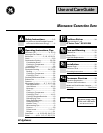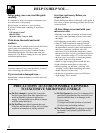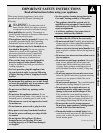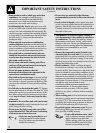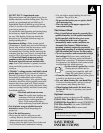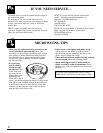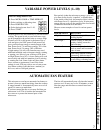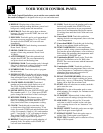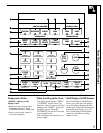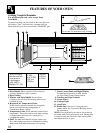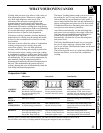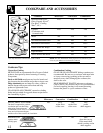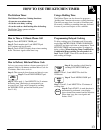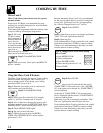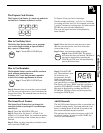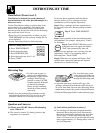
2
HELP US HELP YOU…
Before using your oven, read this guide
carefully.
It is intended to help you operate and maintain your
new microwave oven properly.
Keep it handy for answers to your questions.
If you don’t understand something or need more
help, call:
GE Answer Center
®
800.626.2000
24 hours a day, 7 days a week
Write down the model and serial
numbers.
You’ll find them on a label on the left side wall of the
control panel seen when the door is open.
These numbers are also on the Consumer Product
Ownership Registration Card that came with your
microwave oven. Before sending in this card, please
write these numbers here:
Model Number
Serial Number
Use these numbers in any correspondence or service
calls concerning your microwave oven.
If you received a damaged oven…
Immediately contact the dealer (or builder) that sold
you the oven.
Save time and money. Before you
request service…
Check the Problem Solver in the back of this guide. It
lists causes of minor operating problems that you can
correct yourself.
All these things are normal with your
microwave oven.
• Dimming oven light and change in blower sound
may occur while operating at power levels other
than high.
• Dull, thumping sound while oven is operating.
• Some TV-radio interference might be noticed
while using your microwave oven. It’s similar to
the interference caused by other small appliances
and does not indicate a problem with your
microwave. If you notice this interference, check
that the microwave oven is on a different electrical
circuit, relocate the radio or TV as far away from
the microwave as possible, or check the position
and signal of the receiving antenna.
• Steam or vapor escaping from around the door.
• Light reflection around door or outer case.
• During cooking you will hear “cracking” and
“popping” noises which are nothing more than
normal expansion of the oven.
• At the end of microwave cycles you will hear a
slight thump. This is normal.
(a) Do Not Attempt to operate this oven with
the door open since open-door operation can
result in harmful exposure to microwave
energy. It is important not to defeat or tamper
with the safety interlocks.
(b) Do Not Place any object between the oven
front face and the door or allow soil or cleaner
residue to accumulate on sealing surfaces.
(c) Do Not Operate the oven if it is damaged. It is
particularly important that the oven door close
properly and that there is no damage to the:
(1) door (bent)
(2) hinges and latches (broken or loosened)
(3) door seals and sealing surfaces.
(d) The Oven Should Not be adjusted or repaired
by anyone except properly qualified service
personnel.
PRECAUTIONS TO AVOID POSSIBLE EXPOSURE
TO EXCESSIVE MICROWAVE ENERGY



